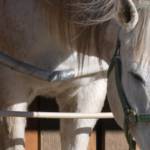Sick Horses: Get Them Eating

Several conditions in adult horses can cause rapid weight loss, either because the horse is not eating enough to offset metabolic processes or because ingested material is not being digested for some reason.
Disease conditions that may cause rapid weight loss include sepsis, pleuropneumonia, and deep-seated bacterial infections such as pulmonary or abdominal abscesses. Factors involving proper function of the gastrointestinal tract include diarrhea, colic surgery involving bowel resection, and intestinal disorders characterized by protein loss and nutrient malabsorption. Severe trauma of any kind can also cause rapid weight loss. Any horse in one of these situations needs to eat voluntarily, or have nourishment provided in some other way. (The nutrition of horses immediately following colic episodes requires special management. See this article for tips specific to feeding horses after colic.)
As long as they stay hydrated, well-conditioned horses that are not pregnant or lactating can usually withstand two to four days of eating very little. On the other hand, regardless of the duration of illness, very thin horses and those that have recently lost a substantial amount of body weight will require immediate nutritional support.
For some other horses, brief periods without eating are unusually dangerous. Obese equines, especially fat ponies and miniature horses, can’t tolerate even short periods of anorexia because of the risk of liver and kidney problems. Newborn foals are also poorly tolerant of short periods of undernutrition. Particularly during the first week of life, foals have negligible energy stores, and negative energy balance can quickly result in hypoglycemia, generalized weakness, and death.
In many sick horses, treatment of the primary problem (such as pain or sepsis) is essential for restoration of normal appetite. Relief of pain and fever by administration of nonsteroidal anti-inflammatory drugs may improve feed intake in some horses. Horses that are reluctant to eat can sometimes be tempted by feeds that are especially appealing. Although hospitalized horses should ideally be offered feeds similar to those fed at home, it is often necessary to provide a variety of feedstuffs to encourage intake.
Kathleen Crandell, Ph.D., an equine nutritionist with Kentucky Equine Research, suggests, “Highly palatable feeds such as fresh grass, leafy hays, and small amounts of grain or bran mash containing some grain can be offered. Only small amounts of these feeds should be offered initially to avoid problems such as diarrhea and laminitis.” Increases in grains or concentrates should be limited to no more than 1 lb (0.5 kg) per day for an average-sized horse. In healthy horses, addition of molasses to grains improves voluntary intake, and this approach has been successful in some sick horses. Feeding oils will increase energy intake in the face of suboptimal feed consumption.
If all attempts to get the horse to eat voluntarily end in failure, the next step is delivering nutrients through a nasogastric tube. If possible, this method of feeding is preferable to intravenous nutrition because it helps to preserve intestinal function, and a greater quantity of food can be delivered. Nasogastric feeding should only be performed by a veterinarian.








